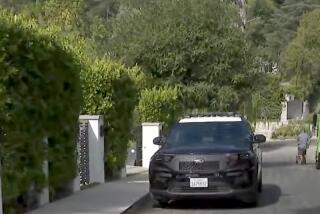Drawing a Bead on Gun Sales
The FBI considers Irvine one of the nation’s safest cities, a master-planned community where nagging issues range from lawn maintenance to the early morning howl of leaf blowers.
But there’s a new debate in town: gun control.
A city councilman has drafted a proposal that would be among the toughest gun laws in the state, making it nearly impossible for new retailers to sell firearms. All in a city where gun violence is minimal.
Councilman Chris Mears’ ordinance would make it illegal to sell firearms within 1,000 feet of churches, schools, playgrounds or city-owned buildings. And in Irvine, most every commercial center is within a short walking distance of one or more of these.
“It’s simply an effort to provide us with a slightly greater degree of local control and confidence about gun sales,” said Mears. And just in case there’s a corner of the city where a gun dealer could set up shop--something that won’t be known until the proposal is studied--the ordinance also would require the dealer to obtain a special business permit, pass a background check conducted by police, carry liability insurance and keep a log of all ammunition sales.
The proposal already has raised the ire of anti-gun-control lobbies.
“The ordinance is designed to harass and create bureaucracy and make it impossible for gun dealers to do business in the city,” said Chuck Michel, an attorney for the Fullerton-based California Rifle and Pistol Assn.
The proposed ordinance, which won’t come before the council for at least a month, takes a different tack from state gun laws, which require a 10-day waiting period for firearm purchases. Such cooling-off periods give the Department of Justice time to screen a gun buyer’s background and check for felony convictions. Felons are prohibited from owning guns.
According to a survey by Legal Community Against Violence, a San Francisco-based organization that researches local gun measures, only three cities in the state have adopted ordinances that mirror what Mears is proposing--Los Angeles, Oakland and San Francisco. However, all three cover a far-flung geography where guns can be sold in certain areas and have a higher crime rate than Irvine, which has been ranked among the nation’s 10 safest cities of its size for the last decade.
Dozens of cities have experimented with restricted firearm sales--limiting calibers, types of weapons or high-powered bullets--but few have adopted ordinances that could result in an outright ban on the sale of guns.
In 1997, the small Northern California town of Lafayette came close, imposing stiff restrictions on gun dealers, including a ban on gun stores within 1,000 feet of a park, school or residential area.
The city’s sole gun dealer sued Lafayette and lost. He didn’t challenge the 1,000-foot restriction but a restriction on trigger locks. City leaders said they haven’t conducted measurements to determine whether it would be illegal to sell guns in the city’s small retail core.
“We haven’t had any others wanting to come in and set up shop since then,” said Lafayette City Atty. Charles Williams.
Irvine is not awash in gun retailers, either. A Big 5 Sporting Goods near the city-run Alton Athletic Park sells rifles and ammunition, and there are two licensed antique gun dealers. All would be exempt from the proposed ordinance if it is adopted in its current state.
Conforming to local gun ordinances is nothing new to Big 5, said company spokesman Gabriel Friederitchsen.
“There are already a number of cities that have implemented various gun-control ordinances, and we abide by anything the local, state or federal authorities require of us,” Friederitchsen said.
Some Say Measure Is ‘Feel-Good,’ Ineffective
Not all of Mears’ colleagues are impressed by the proposed gun ordinance.
“It’s a rather puzzling ordinance,” Councilman Greg Smith said. “It feels good, but it doesn’t serve much of a purpose. It’s just a statement.”
Smith said the proposal falls in line with past efforts in Irvine to adopt “feel-good” ordinances that are largely symbolic, such as a previous council’s decision to declare the city a “nuclear-free zone.”
Michel, the rifle association attorney, said he hopes to persuade Mears to tackle gun control in other ways.
“Irvine’s program wouldn’t address the illegal purchase of guns directly,” Michel said. “There are other programs that don’t require an ordinance and that deal with this problem much more effectively, and the dealers are happy to do it.”
Michel pointed to a program Anaheim implemented in August 2000 that requires gun dealers to notify authorities immediately after someone has been denied authorization to purchase a firearm.
Typically, the Department of Justice notifies the dealer of its findings first. Sometimes, the justice department doesn’t notify local authorities right away--or at all.
“What police in Anaheim did was go for a strategic alliance with the gun dealers, so if a dealer gets a reject notice from the Department of Justice, he calls the Anaheim Police Department right away,” said Michel, who worked with Anaheim in developing the program. “Then when the guy goes to the store to pick up his gun, police can arrest him. So we get these people off the street rather than let them slip off into the wind.”
Anaheim’s Program Results in Arrests
So far, the program has resulted in about a dozen arrests, said Anaheim Police Sgt. Rick Martinez.
“If we didn’t have this program in place, we wouldn’t have known about those 10 to 15 people,” Martinez said. “They wouldn’t get the gun, but there also wouldn’t be any follow-through.”
Some cities have attempted to regulate adult businesses through similar zoning ordinances, creating restrictions that prohibit the businesses from operating within 1,000 feet of “sensitive” areas. But the restrictions don’t always hold up in court.
Simi Valley fought for several years to regulate adult businesses through a zoning ordinance. But last year, the U.S. Supreme Court let stand an appeals court ruling that found the city had violated an adult-club owner’s 1st Amendment rights by denying him a zoning permit.
Proponents of gun-control measures say dealing with firearms is a different game altogether.
“Cities don’t have to have gun dealers in their community,” said Andres Soto, a policy analyst for Pacific Center for Violence Prevention, which tracks and promotes local gun-control measures. “They have complete local discretion over what they want and don’t want within their city limits.”
Soto credits local gun ordinances, such as the one Irvine is considering, for a consistent decline in gun sales, and gun-related deaths and injuries.
“If you limit the number of conduits in which firearms come into a community and you regulate those that exist, you clean up the business,” he said. “The result is [fewer] guns are sold, and gun crime goes down.”
And using the 2nd Amendment as a legal argument to fight such ordinances likely won’t be accepted in court, said Andy Spafford, a senior staff attorney for the Legal Community Against Violence.
The 2nd Amendment says that since a well-regulated militia is necessary “to the security of a free state, the right of the people to keep and bear arms shall not be infringed.”
Spafford said he believes “The 2nd Amendment applies only to the regulation of a state militia. . . . Since that isn’t impinged upon by regulating the location of gun dealers, you don’t have a basis for raising the 2nd Amendment as an issue.”
Mears, who said his proposed ordinance wasn’t motivated by a particular incident, said he’s not trying to put Big 5 or the hobbyists out of business. But he does want the city to pick up where state and federal laws on gun sales leave off.
“It’s something we can do about the proliferation of gun violence in society,” Mears said. “And I think it’s appropriate for us on a local level to do what we can and say what kind of a community we want.”
(BEGIN TEXT OF INFOBOX/INFOGRAPHIC)
Lowering the Sites for Firearms
Irvine is considering a gun ordinance that would make it nearly impossible for new retailers to sell firearms within its borders.
Jurisdictions with all of the restrictions Irvine is considering:
1. Los Angeles
2. Oakland
3. San Francisco city and county
Restrictions that the above jurisdictions and many others in California impose:
*Require firearms dealers to keep ammunition sales records
*Require employee background checks
*Require firearms dealers to carry liability insurance
*Prohibit firearms dealers near sensitive areas++
*Require firearms dealers to obtain local permit
Source: Legal Community Against Violence
++Daycare facilities, schools, parks, places of worship, community/recreation centers
More to Read
Get the L.A. Times Politics newsletter
Deeply reported insights into legislation, politics and policy from Sacramento, Washington and beyond. In your inbox three times per week.
You may occasionally receive promotional content from the Los Angeles Times.










